Five leading Zakat agencies in Nigeria have disbursed the sum of N486.5m to 4,601 beneficiaries in 2023, Muslim News’ findings have revealed.
The distribution cut across various states of the country.
Zakat is an important pillar of Islam which aims at economic empowerment and social security of less privileged persons.
According to a report by the Nigerian Bureau of Statistics in 2022, 63 per cent of Nigerians are multi dimensionally poor.
There have been concerted efforts led by the government — federal, state and local — to reduce the level of poverty in the country through different initiatives and programmes.
Given the limited resources available to it, the government alone cannot take on the task of significantly reducing the poverty level among Nigerians.
The government’s efforts are being complemented by corporate organisations and individuals who also organise programmes to empower the poor and needy in the Nigerian society.
Zakat institutions have been at the forefront of this private sector-led effort to eradicate poverty in Nigeria.
Over the years, zakat institutions have empowered vulnerable Nigerians with their different programmes including health, education and business, among others.
Muslim News also gathered that it is not only the private sector that leads zakat collection and disbursement efforts in Nigeria, there are subnational governments, especially in the northern part of the country where zakat agencies have been instituted to collect and disburse zakat to indigents.
In this report, however, Muslim News focuses on the top five zakat institutions in Nigeria and their disbursements for the year 2023.
These institutions are: the Zakat and Sadaqat Foundation; Jaiz Charity and Development Foundation; Nasfat Agency for Zakat and Sadaqat (NAZAS); Lekki Muslim Ummah (LEMU); and The Companion Zakat Fund, an organisation of Muslim men in business and the professions.
In 2023 alone, they all pulled the feat of disbursing the total sum of N486.5m to 4,601 persons in Nigeria.
1. Zakat and Sadaqat Foundation
Founded in the year 2000, the Zakat and Sadaqat Foundation was a result of creative ideas to revive zakat considered the most neglected pillar of Islam. It was floated by The Muslim Congress (TMC), a leading faith-based organisation in Nigeria.
The Zakat and Sadaqat Foundation was inaugurated as a not-for-profit organisation with the primary objective of delivering quality zakat assessment, collection and distribution services to both private and public individuals as well as corporate organisations as provided in the Qur’an.
The 23-year-old institution disbursed a total sum of N294,680,412 to 3,624 beneficiaries across 27 states in the year 2023 alone.
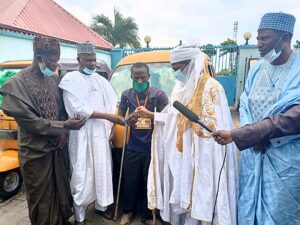
This was disclosed by the Executive Director/Chief Executive Officer, Prince Olagunju Sulyman, at a ceremony to round off their zakat distribution exercise in Lagos on September 17.
Muslim News gathered that the disbursement went into various categories, including empowerment of artisans, traders and small-scale businesses, house rent payment support, education support, and health-related challenges support, among others.
Speaking at the ceremony, the ED/CEO said the 2023 edition marked the 19th zakat disbursement ceremony of the organisation.
“We are indeed grateful to Allah who has helped us this far. We are equally appreciative of our zakat payers who repose their trust in us and have enabled us to serve Allah through their contributions. Your continuous payment of zakat and sadaqat for onward disbursement to the rightful beneficiaries has made the foundation a household name across the country,” he said.
2. Jaiz Charity and Development Foundation
The Jaiz Charity and Development Foundation was established in 2012 by Jaiz Bank Plc.
It is charged with the mandate of managing certain types of income not recognized by the bank (non-permissible incomes) or the ones classified as doubtful by the bank’s Advisory Council of Experts (ACE).
Muslim News, however, gathered that other sources of income for the foundation include zakat obligations, endowments, donations, income from investments and grants, among others.
Jaiz Foundation is now 11 years old.
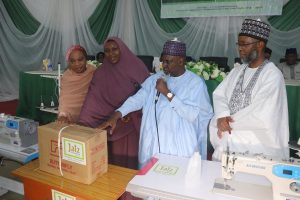
In 2023, it disbursed the total sum of N66.5 million to 1,156 beneficiaries across states and the federal capital territory Abuja.
Speaking at the grand finale of the 2023 zakat distribution in Abuja, Chief Executive Officer of the Foundation, Dr. Abdullahi Shuaib disclosed that Jaiz Foundation has disbursed over N431 million to 9,882 beneficiaries across 29 states of the federation and the FCT since it began zakat collection in 2016.
“Indeed, we feel the pains and agonies of the poor, the needy and vulnerable people in the society, due to the deplorable economic situation of the country,” he said.
3. The Companion Zakat & Sadaqat Fund
The Companion is an association of Muslim men in business and the professions, established in 1984 in Lagos, Nigeria. It is committed to an all-around human development based on the principles of Islam as enunciated by Allah in the Qur’an, exemplified by the Holy Prophet Mohammed (SAW) and lived by the rightly guided companions.
The programmes and activities of The Companion have been organised around four (4) major themes of Da’wah (propagation and enlightenment), education, community engagement, and economic and political empowerment, under which its Zakat and Sadaqat Fund operates.
Since the establishment of The Companion Zakat Fund in 2012 in Lagos, countless number of less privileged Muslim individuals and businesses have benefitted from the annual disbursement.
With a presence in Lagos, Abuja, Kwara, Oyo and Cross River, the Islamic organisation disbursed the sum of N30 million zakat proceeds for the year 2023 to 160 beneficiaries.
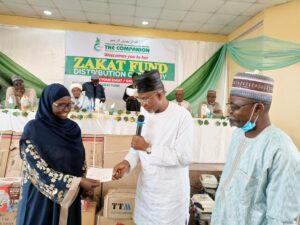
The disbursement ceremony took place in all the five districts of The Companion on different days in June.
Some of the beneficiaries were awarded business grants worth N500,000 each, while others received several items that fulfilled their needs such as deep freezers, pepper grinding machines, flour grinding machines and personal computers (laptops).
Speaking at the disbursement ceremony of the Lagos district, the Amir, Alhaji AbdulKabir Olayiwola Baruwa, noted that zakat being the third pillar of Islam must be embraced by all, stressing that without it, the practice of Islam as a religion would be deficient.
He meanwhile disclosed that the 30 million naira zakat disbursement in 2023 was a shortfall from last year’s, citing economic hardship in the country as a possible factor responsible for the development.
4. NASFAT Agency for Zakat and Sadaqat (NAZAS)
The NASFAT Agency for Zakat and Sadaqat (NAZAS) was created in 2014 by one of the leading Islamic organisations in Nigeria, Nasrullah-l-Fatih Society (NASFAT).
NAZAS is responsible for the collection and distribution of zakat, and it has distributed over N600m to beneficiaries since its inception.
In 2023 alone, NAZAS disbursed the sum of N103m to 200 beneficiaries for the year-end 2022, Chairman of the Board of Directors, Alhaji Hafiz Bakare, made this known during the Annual General Meeting of the agency recently in Ikeja, Lagos.
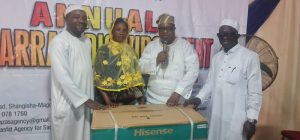
The beneficiaries of the zakat disbursement included Internally Displaced Persons (IDPs), health support and outreach patients, disadvantaged students, empowerment beneficiaries, Train for Fund Scheme awardees, food and clothing recipients, among others.
In his remarks at the ceremony, the Chairman said, “In terms of growth, NAZAS has grown every year in its zakat and sadaqat collection and gained appreciably increased awareness among the Muslim ummah.”
5. Lekki Muslim Ummah (LEMU)
The Lekki Muslim Ummah (LEMU) has a committee on zakat and sadaqat.
In 2023, the committee shared 80 million naira zakat proceeds to 400 beneficiaries.
The 2023 zakat disbursement ceremony held at the Lekki Central Mosque witnessed the distribution of money/cheques and materials such as computers, pepper grinding machines, chest freezers and generators, among others.
The beneficiaries were grouped into eight categories comprising debt relief, business empowerment, sewing apprenticeship programme, youth empowerment program, medical bills, education and scholarship, accommodation bills and emergency provision.

In his remarks at the ceremony, the chairman of the zakat and sadaqah committee, LEMU, Alhaji Olalekan Saliu said more than 60 percent of the zakat proceeds were disbursed for empowerment purposes.
“With the support of LEMU members and an increase in the number of zakat givers, the amount collected went up impressively from about 55 million naira last year to over 82 million naira for the current year. This is an increase of about 45% which is unprecedented,” he added.
Zakat institution established to eradicate poverty – Scholar
In his lecture at the Jaiz Foundation Zakat distribution in Lagos which centred on eradicating poverty in Islam, the Grand Mufti of the Conference of Islamic Organisations, CIO, Sheikh Dhikrullah Shafi’i, said the zakat institution was established to eradicate poverty from mankind.
According to him, Islam is the only religion ordained by Allah for mankind. It is established upon five pillars, of which zakat is the third pillar, meant to eradicate poverty. It is also a means towards economic empowerment and societal reformation.
The revered Islamic scholar encouraged those eligible to pay their zakat while also advising the administrators and recipients.
“Those eligible are expected to remove zakat from their wealth as and when due. The administrators should also ensure that only eligible beneficiaries enjoy it, just like the Jaiz Charity Foundation screens people who qualify to receive zakat. They have been doing a great job in the screening exercise which I am also a part of. The process is transparent. They deserve the praise.
“The beneficiaries should use the zakat proceeds for the right purpose without diverting it for other uses, with the intention that they too will pay zakat soonest. It’s an amanah (trust) and Almighty Allah will ask every beneficiary on the day of judgement (what you did with the zakat given to you). Also, beneficiaries should strive not to always request zakat but to be in a position to give it out.
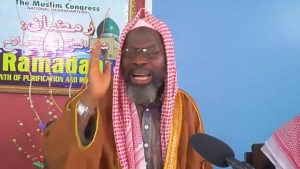
“Finally, we need to encourage the rich Muslims among us to pay zakat to reliable foundations such as Jaiz. We should also encourage the rich to invest in waqf (endowment fund) because it is something that is not common in our society.”
Zakat, not just financial but social, moral responsibility: YABATECH Rector
Speaking at the disbursement exercise of the Zakat and Sadaqat Foundation in Lagos, Dr. Ibrahim Abdul seized the opportunity to praise zakat payers, who have been consistent in paying zakat to ameliorate the suffering of the less privileged in the society. He urged them to continue with the meritorious act.
According to him, “Zakat is not just a financial responsibility. It has a lot to do with moral and social responsibilities. It’s having empathy for people around you and having a feeling about how to cater to the needs of the less privileged in society.

“That is why we appreciate our donors for their consistency. May Allah reward them abundantly. Apart from that, we also call on the elites in the society to identify the issue of observing their social responsibility, especially as regards the payment of zakat so that they can reduce poverty in the community.”
Asked if zakat distribution was not enough to address poverty in society, the YABATECH Rector blamed the economic challenges of the country, saying, “The management of the economy has an impact on the economic well-being of the people, so that is what is responsible for the lack of meaningful impact (of zakat) that we’re seeing.”
The rector admonished the beneficiaries to have a mindset of emancipating themselves from poverty and start by giving sadaqah (small alms) till they can reach the level of zakat payers.
He added, “The mindset is very important. The hands that give are better than the ones that receive and that’s the teaching of Islam. That’s my advice to them (the beneficiaries).”



